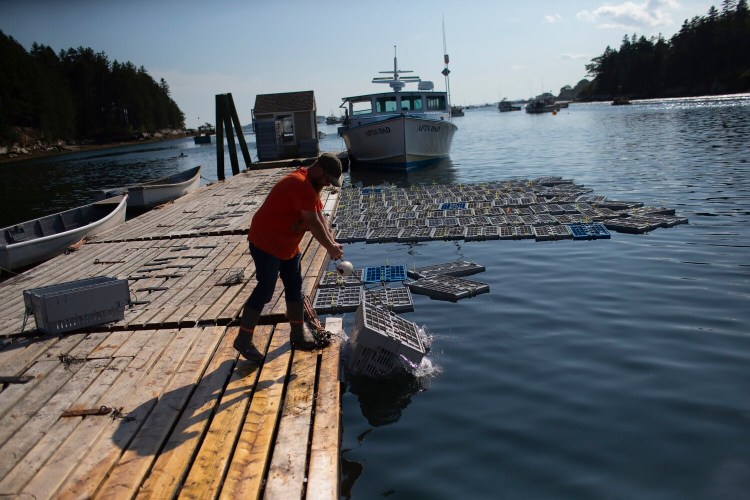A day after Maine lobstermen reported a record-value catch in 2021, a group of lawmakers overwhelmingly endorsed a plan to dole out $30 million in state funds to help the lobster industry comply with new federal conservation rules.
The Maine Legislature’s Marine Resources Committee almost unanimously voted “ought to pass” Tuesday on a bill that would create a relief fund for lobstermen affected by new regulations aimed at protecting endangered North Atlantic right whales.
As written, L.D. 1898 would provide relief money via the state’s general fund, the primary operating fund of Maine state government. Its largest sources of revenue are individual income taxes, sales and use taxes, cigarette taxes and corporate income taxes.
It’s unusual for a state taxpayer-funded relief effort to target a single industry, but Democratic Rep. Holly Stover of Boothbay, the bill’s sponsor, said the strict regulations coming for the lobster industry have created a special circumstance.
“This (bill) is responding to an urgent regulatory change,” Stover said.
The sweeping operational changes present an economic crisis not only to those working in the lobster industry, but also to those in tourism and hospitality, she said.
“For right now, this is one thing that we can move forward on to address an immediate economic impact,” Stover said.
Last year, the National Marine Fisheries Service released a 10-year plan to help protect the critically endangered North Atlantic right whale from deadly entanglements in fishing gear. But Maine lobstermen have said the rules won’t protect whales and will put their livelihoods at risk.
The first phase of the plan, released last August, adds requirements that include state-specific gear marking, weak points in rope to allow entangled whales to break free, and a 967-square-mile seasonal closure off the Maine coast to reduce risks to whales by 60 percent this year and 98 percent over 10 years.
The closed area, a lucrative winter fishing ground off-limits to lobstering from October through January, reopened earlier this month. The other requirements go into effect May 1, although the industry is seeking a 60-day extension.
This first round of changes is expected to cost the industry millions of dollars in lost revenue, additional gear, lost time, added labor and other expenses, according to estimates from the Maine Lobstermen’s Association. There are more than 4,000 working lobstermen in the state.
The proposed $30 million fund, known as the Atlantic Large Whale Take Reduction Plan Impact Fund, would be administered by the Maine Department of Marine Resources.
While it’s unclear how much money individual lobstermen may be receiving, committee members approved a tiered eligibility system based on landings value. Under the system, active lobstermen with federal and state fishing permits earning more than $25,000 a year would be entitled to the most money.
According to Rep. William “Billy Bob” Faulkingham, R-Winter Harbor, that’s because harvesters with federal fishing permits will have to provide two different sets of the expensive new rope. Under the new regulations, Maine lobstermen must use different gear markings for state and federal waters.
An estimated 3,000 lobster fishers will be eligible for some level of relief.
Legislators considered a $500,000 annual earnings cap on eligibility, but they ultimately did not impose one.
The committee vote came just a day after the Department of Marine Resources announced a record-breaking lobster haul for 2021.
Maine lobstermen hauled in about $725 million worth of lobster last year, shattering the previous record of $541 million set in 2016. While the value of the lobster was the highest it’s ever been, the pounds of lobster landed represented the third-lowest annual haul in the past decade. A huge price spike per pound is what pushed the value over the top.
Despite such a strong year, industry leaders say the relief money is still needed.
“Maine’s lobster industry faces unprecedented challenges that threaten to end the fishery within the next decade,” said Patrice McCarron, executive director of the Maine Lobstermen’s Association, in a statement Tuesday. “It will cost at least $45 million for lobstermen to comply with gear modifications, rope configurations, and markings that the federal government is requiring under this burdensome plan.”
McCarron said Maine lobstermen have a long history of complying with federal regulations, “but this most recent rule seriously places one of our nation’s most sustainable commercial fisheries and Maine’s centuries-old lobstering heritage at risk.”
The committee voted to table another bill, L.D. 1916, that would authorize a separate legal defense fund for the lobster industry as it fights the new regulations.
Unlike the economic relief fund, which would rely on taxpayer money, the legal defense fund would be paid for with surcharges on lobster trap tags and licenses. Those fees would generate an estimated $807,000 a year for the fund, but would divert money away from other industry causes.
The committee will resume discussion on the legal defense bill at its next work session, scheduled for Tuesday.
Send questions/comments to the editors.




Success. Please wait for the page to reload. If the page does not reload within 5 seconds, please refresh the page.
Enter your email and password to access comments.
Hi, to comment on stories you must . This profile is in addition to your subscription and website login.
Already have a commenting profile? .
Invalid username/password.
Please check your email to confirm and complete your registration.
Only subscribers are eligible to post comments. Please subscribe or login first for digital access. Here’s why.
Use the form below to reset your password. When you've submitted your account email, we will send an email with a reset code.